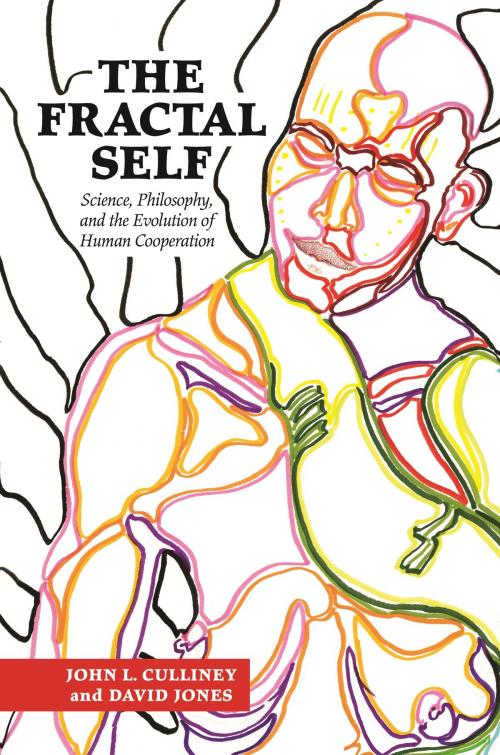The Fractal Self
Science, Philosophy, and the Evolution of Human Cooperation
Nonfiction, Science & Nature, Science, Biological Sciences, Evolution, Other Sciences, Philosophy & Social Aspects, Religion & Spirituality, Eastern Religions, Buddhism| Author: | John L. Culliney, David Jones | ISBN: | 9780824866624 |
| Publisher: | University of Hawaii Press | Publication: | July 31, 2017 |
| Imprint: | University of Hawaii Press | Language: | English |
| Author: | John L. Culliney, David Jones |
| ISBN: | 9780824866624 |
| Publisher: | University of Hawaii Press |
| Publication: | July 31, 2017 |
| Imprint: | University of Hawaii Press |
| Language: | English |
Our universe, science reveals, began in utter simplicity, then evolved into burgeoning complexity. Starting with subatomic particles, dissimilar entities formed associations—binding, bonding, growing, branching, catalyzing, cooperating—as “self” joined “other” following universal laws with names such as gravity, chemical attraction, and natural selection. Ultimately life arose in a world of dynamic organic chemistry, and complexity exploded with wondrous new potential.
Fast forward to human evolution, and a tension that had existed for billions of years now played out in an unprecedented arena of conscious calculation and cultural diversity. Cooperation interleaving with competition; intimacy oscillating with integrity—we dwell in a world where yin meets yang in human affairs on many levels. In The Fractal Self, John Culliney and David Jones uncover surprising intersections between science and philosophy. Connecting evidence from evolutionary science with early insights of Daoist and Buddhist thinkers, among others, they maintain that sagely behavior, envisioned in these ancient traditions, represents a pinnacle of human achievement emerging out of our evolutionary heritage. They identify an archetype, “the fractal self,” a person in any walk of life who cultivates a cooperative spirit. A fractal self is a sage in training, who joins others in common cause, leads from within, and achieves personal satisfaction in coordinating smooth performance of the group, team, or institution in which he or she is embedded. Fractal selves commonly operate with dedication and compassionate practice in the service of human society or in conserving our planet.
But the competitive side of human nature is susceptible to greed and aggression. Self-aggrandizement, dictatorial power, and ego-driven enforcement of will are the goals of those following a self-serving path—individuals the authors identify as antisages. Terrorist leaders are an especially murderous breed, but aggrandizers can be found throughout business, religion, educational institutions, and governments. Humanity has reached an existential tipping point: will the horizon already in view expand with cooperative progress toward godlike emergent opportunities or contract in the thrall of corrupt oligarchs and tribal animosities? We have brought ourselves to a chaotic edge between immense promise and existential danger and are even now making our greatest choice.
Our universe, science reveals, began in utter simplicity, then evolved into burgeoning complexity. Starting with subatomic particles, dissimilar entities formed associations—binding, bonding, growing, branching, catalyzing, cooperating—as “self” joined “other” following universal laws with names such as gravity, chemical attraction, and natural selection. Ultimately life arose in a world of dynamic organic chemistry, and complexity exploded with wondrous new potential.
Fast forward to human evolution, and a tension that had existed for billions of years now played out in an unprecedented arena of conscious calculation and cultural diversity. Cooperation interleaving with competition; intimacy oscillating with integrity—we dwell in a world where yin meets yang in human affairs on many levels. In The Fractal Self, John Culliney and David Jones uncover surprising intersections between science and philosophy. Connecting evidence from evolutionary science with early insights of Daoist and Buddhist thinkers, among others, they maintain that sagely behavior, envisioned in these ancient traditions, represents a pinnacle of human achievement emerging out of our evolutionary heritage. They identify an archetype, “the fractal self,” a person in any walk of life who cultivates a cooperative spirit. A fractal self is a sage in training, who joins others in common cause, leads from within, and achieves personal satisfaction in coordinating smooth performance of the group, team, or institution in which he or she is embedded. Fractal selves commonly operate with dedication and compassionate practice in the service of human society or in conserving our planet.
But the competitive side of human nature is susceptible to greed and aggression. Self-aggrandizement, dictatorial power, and ego-driven enforcement of will are the goals of those following a self-serving path—individuals the authors identify as antisages. Terrorist leaders are an especially murderous breed, but aggrandizers can be found throughout business, religion, educational institutions, and governments. Humanity has reached an existential tipping point: will the horizon already in view expand with cooperative progress toward godlike emergent opportunities or contract in the thrall of corrupt oligarchs and tribal animosities? We have brought ourselves to a chaotic edge between immense promise and existential danger and are even now making our greatest choice.















